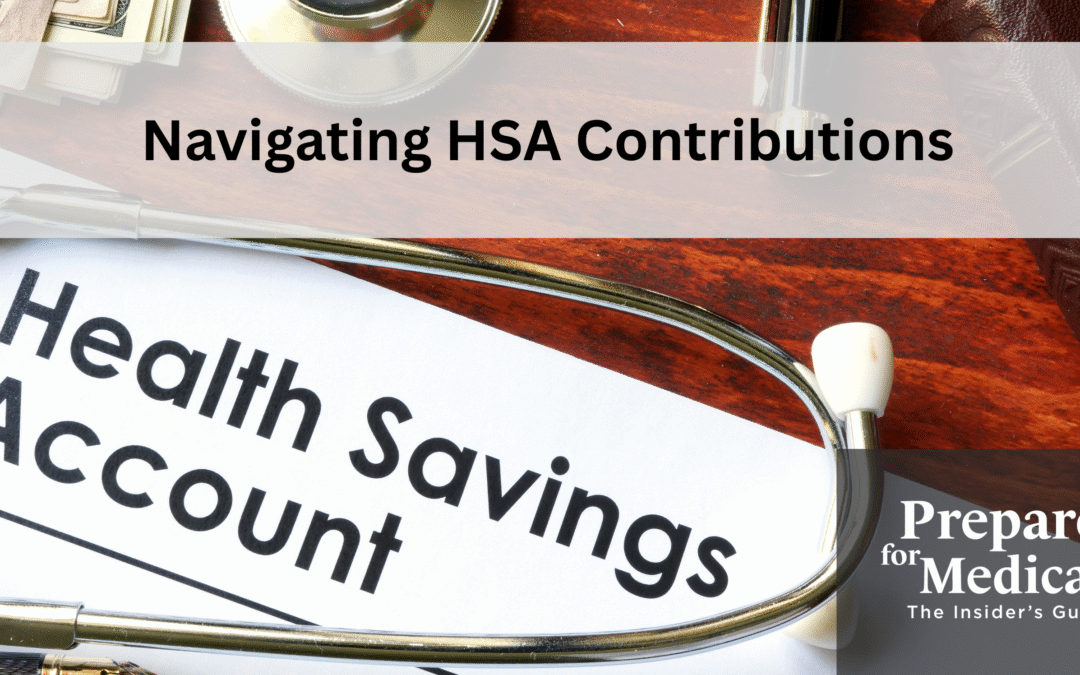When Should I Stop HSA Contributions Before Medicare? (Part A vs. Part B)
Short answer: You must stop contributing to your HSA when you enroll in Medicare Part A or Part B. Because Part A is retroactive up to six months (but not earlier than your 65th birthday), you generally need to stop HSA contributions at least 6 months before your Medicare start date to avoid excess contributions and tax penalties.
Quick Guide: HSA & Medicare Rules You Must Know
- Enrolled in any part of Medicare (A or B)? You can’t contribute to an HSA.
- Part A retroactivity: Coverage can backdate up to 6 months from your enrollment (not before age 65). Plan your final contribution accordingly.
- Spending is fine: You can still spend existing HSA funds tax-free on qualified expenses after enrolling in Medicare.
New to Medicare planning? Read Turning 65: How to Set Up Medicare Without Lifetime Penalties to time everything correctly.
When Should I Stop HSA Contributions Before Medicare?
Because of Part A’s retroactive rule, most people should stop HSA payroll and personal contributions 6 months before their Medicare effective date. This helps you avoid “excess contributions” that may trigger taxes and potential penalties.
- If you’ll take Part A at 65: Stop HSA contributions 6 months prior to your planned Part A start date.
- If you delay Medicare past 65: Stop HSA contributions 6 months before you actually enroll later on.
- If you already contributed too much: Ask your HSA custodian about removing excess contributions (and earnings) to reduce penalties.
For policy changes that can impact timing, see Medicare Changes.
HSA Contributions While on Medicare: What’s Allowed (and What Isn’t)
- Not allowed: New HSA contributions (employee or employer) once you’re enrolled in Part A or Part B.
- Allowed: Use existing HSA dollars tax-free for qualified medical expenses, including Medicare premiums (not Medigap), copays, deductibles, and many out-of-pocket costs.
Common pitfalls to avoid are covered in Medicare Mistakes to Avoid.
Accepting Medicare Part A and Deferring Part B: Can I Keep Contributing?
No. Part A enrollment alone stops HSA eligibility. Even if you defer Part B because you’re still working and covered by an employer plan, you must end HSA contributions (and mind the 6-month retroactive window for Part A).
Official guidance: IRS Publication 969 (HSAs) and Medicare.gov: Should I Get Parts A & B?
Example: Emily’s Timeline for Stopping HSA Contributions
Emily is 65, still working, and on her employer’s HSA-qualified HDHP. She wants Part A now but will defer Part B until she retires.
- Stop contributions 6 months before her Part A start date to avoid excess contributions due to Part A retroactivity.
- Enroll in Part A and defer Part B while keeping employer coverage.
- Continue using existing HSA funds tax-free for qualified expenses, including Medicare costs later.
Alternatives After You Stop HSA Contributions
- Use your HSA as a “spend-down” fund for qualified medical costs in retirement.
- Consider FSAs or HRAs if available through your employer (rules differ from HSAs).
- Review Medicare budget: premiums, deductibles, copays, and medications.
- Compare coverage options: Original Medicare + Medigap vs. Medicare Advantage.
Checklist: Budgeting for Healthcare in Retirement
- Estimate annual costs (premiums, drugs, routine care, unexpected bills).
- Decide how you’ll cover gaps (HSA balance, savings, Medigap/MA).
- Confirm employer coverage rules if you’ll work past 65.
- Mark your calendar for key Medicare dates and enrollment windows.
FAQ: Stopping HSA Contributions Before Medicare
What if my employer keeps contributing to my HSA after I start Medicare?
Employer HSA contributions after your Medicare start date generally count as excess contributions. Talk to your benefits team and HSA custodian ASAP to remove the excess.
Can I pay Medicare premiums from my HSA?
Yes, many Medicare premiums (e.g., Part B, Part D, and Medicare Advantage) are qualified medical expenses. Medigap premiums are not.
Is Part A ever not retroactive?
Retroactivity is limited to 6 months and never before your 65th birthday. The practical takeaway: stop HSA contributions 6 months before your Medicare start date.
Next Step If You’re Nearing 65
Time your enrollment and contributions carefully to avoid penalties and coverage gaps. Start with this primer: How to Set Up Medicare Without Lifetime Penalties.




